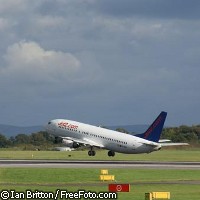Growing environment and security concerns prompt aeronautics research agenda update
Europe's aeronautics research community has updated its research agenda to take into account rising environmental concerns, the need for alternative fuels and rapidly changing security threats. The Advisory Council for Aeronautics Research in Europe (ACARE) published its last Strategic Research Agenda (SRA) four years ago. Since then, we have seen wild fluctuations in oil prices and the collapse of the dollar against the Euro (which seriously weakened the competitiveness of the European aeronautics industry). At the same time, environmental concerns have shot up the political agenda and increasingly complex and cumbersome security measures have been introduced in airports around the world. ACARE's Strategic Review Group put together this new addendum to the SRA with the aim of addressing these urgent challenges. A full review of the SRA will be carried out in 2010. The group found that overall, the direction and content of the SRA remains valid and significant progress has been made in many areas. Recent years have seen the launch of the Clean Sky Joint Technology Initiative (JTI), which aims to reduce the impact of aviation on the environment and numerous research projects have received funding from the EU's Sixth and Seventh Framework Programmes (FP6 and FP7). Nevertheless, the group notes that more research funding is urgently needed. 'These research aspects would move forward quicker with more investment,' the addendum reads. 'The non-availability of the full funds, identified as necessary in the Research Agenda, is an obstacle to progress.' The addendum also recommends that 'adjustments and accelerations' be made in the areas of environmental technologies, the development of alternative fuels and security systems. The environmental challenge is twofold; the sector must reduce its impact on both climate change and local noise and air quality. The reviewers state that both public and private investments are urgently needed to develop the breakthrough technologies that are required if the aviation sector is to drastically reduce its greenhouse gas emissions. The addendum also highlights the need for alternative fuels; the world's fossil fuel reserves are in decline, and the technological options offered by alternative fuels as well as their environmental and economic implications need to be studied in detail. In the area of security, the rapidly changing nature of threats to airport and aircraft security and the increase in security measures at airports are resulting in growing delays for passengers. The addendum calls for the development of more capable, less intrusive systems at the level of both deterrence and detection. Security technologies should also be designed to cope with the highly variable nature of security threats.



